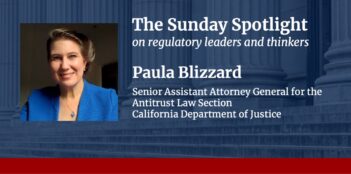
A recently passed state disclosure law will help reveal who pays for political ads.
This November, Californians will vote for 80 State Assembly members, 20 state senators, and a new governor, as well as face choices over a number of citizen-initiated ballot measures. With so much at stake, over 19 million voters can expect moneyed interests to try and influence the vote through blanketing the state with a flurry of advertisements. Yet in this upcoming election—for the first time—voters will have the opportunity to learn more about the organizations funding those ads.
A recently passed law known as the California Disclose Act requires greater transparency in political advertising and funding to help voters make informed decisions. The Disclose Act makes numerous amendments to the state’s flagship law that regulates campaign finance and electoral activity.
The law responds to growing concerns about dark money—contributions from advocacy groups that need not disclose their donors’ identities. These contributions may only further amplify the power of money in the electoral process and make it unclear who actually funds political advertisements.
California may have found a way to alleviate concerns about dark money.
The Disclose Act requires independent political committees that support candidates or ballot measures to display information about who funds their advertisements prominently, either at the beginning or end of publicly-disseminated advertisements. Generally, the ads must display an independent committee’s top three financial donors that contributed $50,000 or more so that viewers can easily see them. Backers of the law say that this requirement should help end the current practice of burying disclosures in fine print.
The law’s disclosure provisions apply to advertisements on all media—whether television, print, social media, or radio. The law’s sponsor, Assemblyman Kevin Mullin (D-San Mateo), lauded the state’s “historic first step to shine the light on ‘dark money,’” stating that “transparency is critical to our democracy.”
To provide voters with the most timely and accurate information, the Disclose Act imposes an ongoing requirement that independent committees regularly amend their disclosures to reflect changes in their top contributors.
The Disclose Act’s requirements apply only to independent political committees; it does not require candidate-controlled committees or political parties to disclose their top contributors.
The Disclose Act does, however, prohibit candidate committees from collaborating with independent committees so that the latter may evade disclosing individuals, businesses, and business entities as top contributors. This provision takes aim at the common practice of having innocuous-sounding organizations fund ads to appeal to voters’ sense of trust. Groups with names like “Californians for a Brighter Future” sound trustworthy, but their names reveal little about who they represent.
The Disclose Act also regulates “earmarking,” a practice where donors contribute money to one political committee on the condition that it donate all or part of that contribution to another committee, ballot measure, or candidate to evade campaign finance disclosure rules.
Under the new law, all political committees must maintain records of all donors who have contributed at least $100 so that the California Fair Political Practices Commission (FPPC)—the state’s non-partisan campaign finance enforcement body—can track potential earmarking. A committee that makes an earmarked contribution must provide the recipient committee with the original contributors’ names, addresses, and size of their contributions.
The Disclose Act creates an exception to its earmarking regulations for “dues…and similar payments made to a membership organization or its sponsored committee,” such that those bodies need only disclose donors that contribute $500 or more. This exception would, for example, shield individuals who contribute $100 in dues to their union from disclosure but not a business owner who contributes the same amount to a political committee.
The California Clean Money Campaign, an organization that promotes government accountability and sponsored the Disclose Act, heralded the Disclose Act’s passage. But not everyone has celebrated the new law. Assemblyman Matthew Harper (R-Huntington Beach) voted against the Disclose Act, reportedly arguing that its earmarking exception provides preferential treatment to Democratic candidates and the public sector labor unions that financially support them. “While the intentions of this bill are good, it creates a massive loophole and therefore an unfair playing field,” said Harper.
The state FPPC also opposed the bill. FPPC Chair Jodi Remke reportedly expressed concern that the Disclose Act would, among other things, constrict the FPPC’s ability to track earmarked contributions by narrowing the definition of earmarking. The FPPC also cautioned that the new regulations would take effect during an election year and “cause significant confusion and compliance issues for the regulated community.”



